Digital Marketing
Service Overview
E-Com Solvers Digital Marketing: Boosting Your Business
E-Com Solvers is a digital marketing agency specializing in crafting tailored strategies to enhance the online presence and performance of e-commerce businesses. Leveraging a range of digital marketing techniques, E-Com Solvers aims to drive traffic, increase conversions, and maximize ROI for their clients. Here’s a detailed look at how E-Com Solvers can boost any business through their digital marketing services:
1. Comprehensive Digital Marketing Strategy
a. Initial Business Assessment
- Market Analysis: Conduct in-depth market research to understand the business landscape, target audience, and competitive environment.
- Goal Setting: Collaborate with clients to define clear business objectives and marketing goals, such as increasing sales, enhancing brand awareness, or growing customer engagement.
b. Customized Strategy Development
- Tailored Plans: Develop a digital marketing strategy that aligns with the specific needs and goals of the business. This may include a mix of SEO, paid advertising, content marketing, and social media.
- Budget Allocation: Create a budget plan to allocate resources effectively across different digital channels and campaigns.
2. Search Engine Optimization (SEO)
a. On-Page Optimization
- Keyword Research: Identify relevant keywords and phrases that potential customers are searching for.
- Content Optimization: Optimize website content, meta tags, and headers to improve search engine rankings and relevance.
b. Technical SEO
- Site Performance: Enhance website speed, mobile responsiveness, and user experience to improve search engine rankings and reduce bounce rates.
- Structured Data: Implement structured data (schema markup) to help search engines understand and display your content more effectively.
c. Off-Page SEO
- Link Building: Develop a strategy to acquire high-quality backlinks from reputable sites to boost domain authority.
- Local SEO: Optimize for local search queries and manage local business listings to attract nearby customers.
3. Pay-Per-Click (PPC) Advertising
a. Campaign Setup and Management
- Ad Creation: Design compelling ad copy and creatives that resonate with your target audience.
- Targeting: Use advanced targeting options to reach specific demographics, interests, and behaviors.
b. Performance Monitoring
- Analytics: Track key metrics such as click-through rates (CTR), conversion rates, and cost per acquisition (CPA).
- Optimization: Continuously optimize campaigns based on performance data to maximize ROI and reduce ad spend wastage.
4. Content Marketing
a. Content Creation
- Blog Posts: Develop informative and engaging blog content that addresses the interests and needs of your target audience.
- Visual Content: Create high-quality images, infographics, and videos to enhance engagement and shareability.
b. Content Distribution
- Social Media: Share content across social media platforms to increase visibility and drive traffic.
- Email Marketing: Use email newsletters to deliver valuable content and promotions directly to subscribers.
5. Social Media Marketing
a. Platform Strategy
- Channel Selection: Choose the right social media platforms based on where your target audience is most active (e.g., Facebook, Instagram, LinkedIn, TikTok).
- Content Calendar: Develop a content calendar to plan and schedule posts consistently.
b. Engagement and Community Building
- Interactions: Engage with followers by responding to comments, messages, and reviews.
- Influencer Partnerships: Collaborate with influencers to expand your reach and credibility.
6. Email Marketing
a. Campaign Development
- List Building: Grow your email list through lead magnets, opt-in forms, and promotions.
- Segmented Campaigns: Create targeted email campaigns based on customer behavior, preferences, and purchase history.
b. Performance Analysis
- Metrics Tracking: Monitor open rates, click-through rates, and conversion rates to evaluate campaign effectiveness.
- A/B Testing: Conduct A/B tests to optimize subject lines, email content, and calls to action.
7. Conversion Rate Optimization (CRO)
a. User Experience (UX) Design
- Website Usability: Improve website navigation, design, and functionality to enhance the user experience.
- Conversion Funnels: Analyze and optimize the conversion funnel to reduce drop-offs and increase conversions.
b. Testing and Analytics
- A/B Testing: Test different elements of your website (e.g., CTAs, landing pages) to determine what drives the highest conversion rates.
- Heatmaps and Analytics: Use heatmaps and analytics tools to understand user behavior and identify areas for improvement.
8. Analytics and Reporting
a. Data Collection
- Performance Metrics: Track and analyze key performance indicators (KPIs) such as traffic, engagement, conversions, and revenue.
- Customer Insights: Gather data on customer behavior, preferences, and feedback.
b. Reporting and Recommendations
- Regular Reports: Provide detailed reports on campaign performance, including insights and actionable recommendations.
- Strategic Adjustments: Use data-driven insights to refine strategies and improve overall marketing effectiveness.
9. Integration and Automation
a. Tool Integration
- Marketing Tools: Integrate various marketing tools and platforms (e.g., CRM systems, email marketing software) for a seamless workflow.
- Data Synchronization: Ensure that data across different systems is synchronized and up-to-date.
b. Automation
- Marketing Automation: Implement automation for tasks such as email follow-ups, social media posting, and lead nurturing.
- Customer Journeys: Create automated customer journeys to deliver personalized experiences and increase engagement.
10. Ongoing Support and Consultation
a. Continuous Improvement
- Strategy Reviews: Regularly review and adjust marketing strategies based on performance and market changes.
- Expert Advice: Provide ongoing consultation and support to address any challenges and capitalize on new opportunities.
b. Training and Development
- Skill Development: Offer training and resources to help clients understand and leverage digital marketing strategies effectively.
- Best Practices: Share industry best practices and emerging trends to keep clients ahead of the competition.
By utilizing E-Com Solvers’ comprehensive digital marketing services, businesses can enhance their online presence, attract more customers, and drive growth. Their expertise in various digital channels ensures a holistic approach to marketing that aligns with the unique needs and goals of each business.





